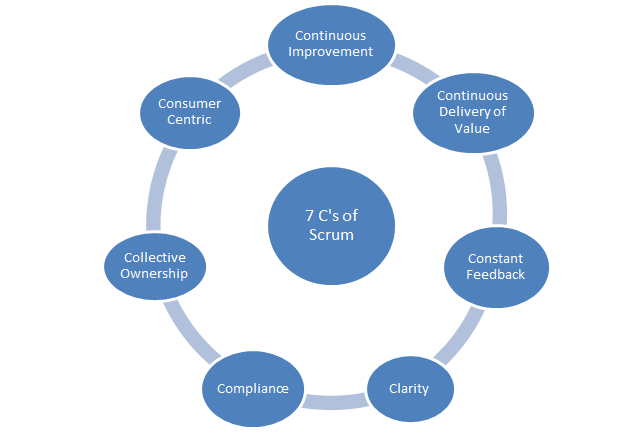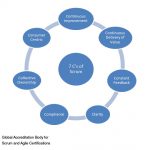Scrum is an iterative and incremental product development framework which ensures that the highest value is delivered to the consumer or the customer. 7 C’s of Scrum are the characteristics which ensure the highest value delivery through scrum framework. These C’s are discussed below:
- Consumer Centric: The focus of the Product Owner, Scrum Master and The Scrum Team is to understand the Consumer requirements, meet the acceptance criteria of the products, deliver high value and in turn have a satisfied customer.
- Continuous Delivery of Value: Ship deliverable process ensures that there is continuous development and delivery of the project deliverables rather than completing the project in one goes And delivering it to the client.
- Constant Feedback: Daily Stand-up meetings are held wherein each of the scrum team members will let the other team members know about the work he completed yesterday and what he will do today. Also, he let others know about the difficulties he faced in completing the deliverable. The Scrum Master then will work to remove the impediments obstacles faced by the team members.
- Continuous Improvement: Scrum is an iterative, incremental process in which the errors are identified quickly and also there is scope to change the features of the product under development and add new features to it with less cost. This leads to overall reduced cost of errors at the end of the project.
- Compliance: The continuous feedback, flexibility and adaptive nature of the Scrum Teams will help in incorporating the new requirements and changes easily. There is also sprint retrospect meetings held to ensuring the deliverables are in compliance with the requirements.
- Clarity: All the team members share their knowledge and work progress. They ensure information sources of the work in process like the Burndown chart are accessible to all the team members and hence there is clarity among the team members about the project progress.
- Collective Ownership: The team members are involved in Estimating the tasks and efforts and approving the user stories. They are empowered to take decision and hence this allows them to take the ownership of the tasks.
These are the C’s of Scrum which ensure that the products or Service developed by the Scrum Team is with minimal errors and reduced cost of errors and rejections.









